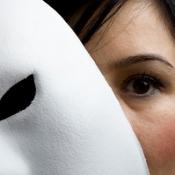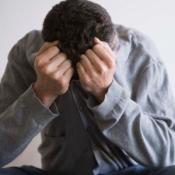 People think of depression as really bad sadness, but it’s actually much more complicated. To be diagnosed with depression, a person has to have several (but not all) of the symptoms from a diagnostic list outlined in the Diagnostic and Statistical Manual (DSM). Sadness is one of these symptoms, but it is possible to have enough other symptoms on the list to be depressed and yet not feel sad.
People think of depression as really bad sadness, but it’s actually much more complicated. To be diagnosed with depression, a person has to have several (but not all) of the symptoms from a diagnostic list outlined in the Diagnostic and Statistical Manual (DSM). Sadness is one of these symptoms, but it is possible to have enough other symptoms on the list to be depressed and yet not feel sad.
The list of depression symptoms includes:
- Lack of interest or pleasure in anything
- Significant increase or decrease in eating
- Insomnia or over-sleeping
- Restlessness or being slowed down physically
- Fatigue or low energy
- Feelings of worthlessness or excessive guilt
- Inability to think, concentrate, or make decisions
- Suicidal thoughts or attempts
- Lack of enjoyment or interest in previously enjoyed activities
- Feeling hopeless, empty, or pessimistic
Most people who are depressed feel sad, but there are several reasons some people can be depressed without feeling sad. These reasons may include:
- Numbness: One scenario that causes people to feel depressed without feeling sad is when depression causes them to feel primarily numb. They don’t feel sad, angry, joyful, or really anything at all. They may feel an amorphous misery, but no specific emotion. They may go through the motions of living without the feelings that motivate and satisfy people. This numbness can be experienced as suffering, but in such an ill-defined way that it isn’t identified as sadness.
- Addictions: Another reason people may not feel sad when they are depressed is the influence of addictions or chemical dependency which prevent them from feeling sad. If a depressed person frequently and compulsively uses alcohol, drugs, other chemicals, sugar, sex, gambling, work, or anything else, he or she may get temporary relief from sadness or even feel euphoric. The person may not realize there is an underlying sadness being suppressed. He or she may feel ups and downs with the chemical variations in the brain, while the chemicals mask the person’s sadness, depression, or whatever else is going on underneath.
- Anger: Sometimes even without external substances or compulsive activities, people can internally turn sadness into other forms, not recognized as sadness. One of those forms is any other emotion. Anger, especially, is often a transformation of another feeling. When people are more comfortable with anger than they are with sadness (or fear or hurt), they may not even experience sadness before it’s converted to anger.
- Obsessing: Similarly, people transform sadness into obsessive (compulsively repetitive) thoughts. For example, people think obsessively about someone they have a crush on, something they regret, or whether their stove is turned off. These or any obsessive thought processes turn off the experience of sadness.
- Somatizing: Another way people transform sadness into another form is through somatizing. Physical pain or illness, such as migraines, digestive problems, or virtually any physical symptoms, can sometimes be a physical experience of sadness that isn’t recognized as sadness. For example, if Nancy’s husband dies and she’s not comfortable or supported in grieving, her back may go into spasm and she may be in such physical pain that she can’t feel sad in a recognizable way—she just feels back pain. In this case, her back pain may be sadness expressed in another form.
- Illness: Another reason people may be depressed without feeling sad is when they have a physical illness, such as thyroid problems, multiple sclerosis, brain injury or tumor, or inflammatory illnesses. Other than the disease itself, there may be nothing sad in the person’s life, but in some physical way we don’t understand, the illness may create symptoms of depression.
- Fluctuations: Even people who feel sad, empty, or hopeless when they get depressed may not feel it constantly. Some people get depressed in a way that is not constant. A minority of depressed people can be distracted from their depression for short periods. These people might feel relatively normal during these periods, even if they feel depression with sadness the rest of the time.
Differences between Sadness and Depression
Another important twist is that people can feel sad, even intensely sad, without depression being involved. When people experience a loss, they usually feel sad, but don’t necessarily feel depressed. Sadness and depression have similarities, but they have some important differences.
When people are sad and express their sadness, they feel better, whereas when people are depressed, crying and expressing their pain may not give them relief. Sadness doesn’t involve mean thoughts about oneself, or hopeless or suicidal thoughts, but depression often does. Sadness doesn’t involve distortion in perception, or loss of perspective, whereas depression usually does. Finally, sadness doesn’t interfere with feeling other emotions, while depression often prevents a range of specific emotions.
In my experience, most people who are depressed have some sense that something is wrong, and if they don’t, people around them usually do. It really doesn’t matter whether suffering fits neatly into the DSM diagnosis for depression or not.
It’s not necessary to diagnose yourself or your loved ones. If you or someone you love is suffering, get professional help to assess what is causing the suffering and what would help relieve it.

The preceding article was solely written by the author named above. Any views and opinions expressed are not necessarily shared by GoodTherapy.org. Questions or concerns about the preceding article can be directed to the author or posted as a comment below.

 The Lies We Tell When We Are Depressed
The Lies We Tell When We Are Depressed Depression and Suicide: How to Know When You Need Help
Depression and Suicide: How to Know When You Need Help 'Just Get Better': Easier Said Than Done with Depression
'Just Get Better': Easier Said Than Done with Depression

Please fill out all required fields to submit your message.
Invalid Email Address.
Please confirm that you are human.
Leave a Comment
By commenting you acknowledge acceptance of GoodTherapy.org's Terms and Conditions of Use.